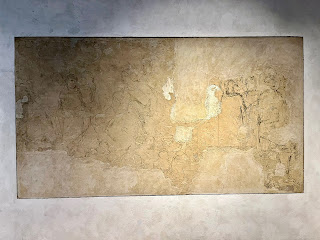(revised on Medium) On books that I shall not write (series: notes to myself) - version 3
Others I should, because I want to finish those drafts, before I die.
But some will remain forever notes, no more than titles on empty folders.
A book on inconsistencies and whether Dolet dies in two different ways in Yourcenar's The Abyss (L'Oeuvre au Noir, Paris: Gallimard, 1968):
p. 151: Dolet ... mon libraire ... il n'ent pas l'occasion d'essayer de ma dragée, s'étant fait dépecher à Venise dans une ruelle obscure par le meme spadassin qui l'avait manqué en France.
p. 185: Depuis qu' E'tienne Dolet, san premier libraire, avait été étranglé et geté au feu pour opinions subversives, Zénon n'avait plus publié en France.
A book on invisible objects and Roland Barthes missing the third soldier in the picture from Nicaragua: "9 [...] a ruined street, two [but there are 3 in the picture reproduced above] helmeted soldiers on patrol; behind them two nuns." Camera Lucida - Reflections on photography, Vintage, London, 2000 (orig. 1980), p. 22-23.
A book called Zugzwang about Bergman, Nabokov, Zweig, the game of chess, and the art of resignation.
A book on semantic immanence, with 12 chapters, each one dedicated to a real book read by a character in another real book, like In the Face of Death by Peter Noll, read by Fredrick Sjöberg in “The Fly Trap by Fredrik Sjoberg. Each read-book to be read in a month, for 12 months, to tell their stories and finally connect them, in a self-referential network of immanence that requires no transcendence.
A book on fallacious smartness. Here are two examples by David Hume and Edgar Morin:
- "'Tis plain it is not the idea of extension. For the idea of extension consists of parts." Hume D. 1978, A Treatise on Human Nature, ed. by L.A. Selby-Bigge, second edition with text revised and variant readings by P.H. Nidditch Clarendon Press, Oxford (first pub. 1739): p. 38
Wrong, in the same sense in which the idea of water is not wet.
- "There are two preliminary difficulties when we want to talk about complexity. [...] The second difficulty is of a semantic nature. If it were possible to define the notion of complexity in a clear way, it would clearly follow that the word would not be complex" Edgar Morin "Le Vie della Complessità", p. 49 in Gianluca Bocchi e Mauro Ceruti (eds.) La Sfida della Complessità, Feltrinelli Milano 1985, pp. 49-60. "Vi sono due difficoltà preliminari quando si voglia parlare di complessità. [...] La seconda difficoltà è di ordine semantico. Se si potesse definire la complessità in maniera chiara, ne verrebbe evidentemente che il termine non sarebbe più complesso".
Wrong, just think about the definition of "undefinable" = that cannot be defined. See? Done. The distinction "use vs. mention" of a word is the abc of any elementary introduction to philosophical logic.
A book on books made only of quotations. Apparently, it was Benjamin's project, according to Adorno, to write a book made only of quotations. See Saverio Campanini, Fragmented Readings, online: "Theodor Wiesengrund Adorno, Charakteristik Walter Benjamins, in «Neue Rundschau» 61 (1950), pp. 571-584; then in Id., Prismen, Suhrkamp, Frankfurt am Main 1955; and in Id., Über Walter Benjamin, Suhrkamp, Frankfurt am Main 1970, p. 26". I recall an entry in an encyclopedia, which said that some Renaissance scholar had actually written such book. I lost the reference. But I won't try to write a book about books only made of quotations because "not even Benjamin, who aspired to something of the sort in his Arcades Project, could refrain from commentary and give himself up completely to the dialectic dance of fragments." Brian Dillon, Suppose a Sentence. The truth is that there are no fragments, only the fragmented, which are shadows of the whole.
Notes to myself is also available as a book on Amazon: http://ow.ly/oPo550KhWex
Notes to myself is also available as a book on Amazon: http://ow.ly/oPo550KhWex









Comments
Post a Comment